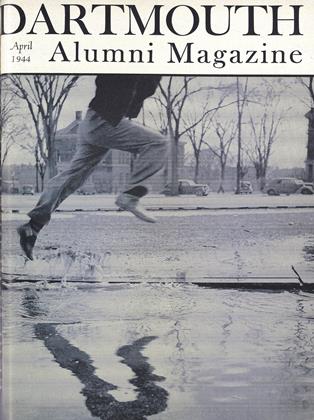DRASTIC CURTAILMENT of the Army Specialized Training Program in the colleges has led a number of alumni, anxious for the welfare of the College, to inquire whether the same thing might not happen in the Navy College Training Program, to which Dartmouth is so fully devoting its resources and war efforts. The answer to such inquiries has been provided recently by Secretary of the Navy Frank Knox, who told a press conference that the Navy at present has urgent need of the officer candidates being trained in the V-12 Program, and also by Vice Admiral Randall Jacobs, Chief of the Bureau of Naval Personnel, who on February 4 released the following statement:
The Bureau of Naval Personnel has recently received a number of inquiries concerning reports that the Navy College P'rogram may be discontinued. All inquirers have been advised that the Navy Department has no plans to discontinue this Program.
The U. S. Navy is still expanding. The urgent need for technically trained young officers continues, and the colleges and universities participating in the V-12 Program are doing a splendid job of producing such officers. While changing war-time conditions may from time to time necessitate revision in the quotas for the Program in order to conform with the needs of the service, the Navy does not contemplate discontinuance of the Program.
In these statements there is added reason for satisfaction that Dartmouth has the privilege of being one of the country's largest participants in the Navy College Training Program. Reassurance at the present time, however, is no reason for becoming forgetful of the fact that there is necessarily an element of uncertainty even in the Navy program and that V-ia contracts can be cancelled upon ninety days' notice. With its civilian enrollment now down to 180 men, Dartmouth is relying .heavily upon its Navy V-12 Unit and is proportionately aware of the difficulties which it would encounter if the Unit were withdrawn or greatly reduced.
This knowledge and the example of what has taken place in the Army program combine to point up the great wisdom of President Hopkins and the Trustees in planning a substantial reserve fund as a safeguard against the uncertainties ahead. Although labeled a "Postwar Reconversion Reserve," this fund might easily have to be drawn upon before the end of the war, and the welfare of the College requires that it be made just as large as possible without delay. The bulk of the present reserve of about $275,000 caiiie from the 1943 Alumni Fund, and the only unlimited source from which an addition to the reserve may be anticipated is the 1944 Fund now being raised by the Alumni Council. That is why this year's Alumni Fund is vitally important to the future of the College and why every alumnus with concern for Dartmouth's welfare will want to give to the limit of his ability to give.
"DARTMOUTH UNDYING" IS SUNG, APPROPRIATELY, IN THE RICHARD HOVEY ROOM
 View Full Issue
View Full Issue
More From This Issue
-
 Article
ArticleCOLLEGE MEN IN POLITICS
April 1944 By DAYTON D. McKEAN -
 Article
ArticleSANBORN ENGLISH HOUSE
April 1944 By LEON BURR RICHARDSON '00 -
 Class Notes
Class Notes1918
April 1944 By ERNEST H. EARLEY, DONALD L. BARR -
 Class Notes
Class Notes1935
April 1944 By ENSIGN JOHN D. GILCHRIST JR., BOBB CHANEY -
 Lettter from the Editor
Lettter from the EditorLetters from Dartmouth Men in the Armed Forces
April 1944 By H. F. W. -
 Class Notes
Class Notes1919
April 1944 By J. KENNETH HUNTINGTON
C. E. W.
-
 Article
ArticleTEAM MEETS "OLD MAN EXPERIENCE"
December 1934 By C. E. W. -
 Article
ArticleEnrollment Guess
October 1950 By C. E. W. -
 Article
Article"Our Best Guess"
January 1951 By C. E. W. -
 Article
ArticleAlumni Officers Meet
June 1951 By C. E. W. -
 Article
ArticleIn Brief . . .
June 1952 By C. E. W. -
 Article
ArticleEnrollment
November 1953 By C. E. W.
Article
-
 Article
ArticleABSTRACT OF RECORD OF TRUSTEES' MEETING
June 1921 -
 Article
ArticleMEETING OF THE ALUMNI COUNCIL
August, 1923 -
 Article
ArticleDirected Growth of College Plant
October 1936 -
 Article
ArticleWith the Big Green Teams
JANUARY 1966 -
 Article
ArticleConfessions of a pro circuit skier
APRIL • 1985 By John Kennedy '84 -
 Article
ArticleThe Cover
May 1935 By The Editors

